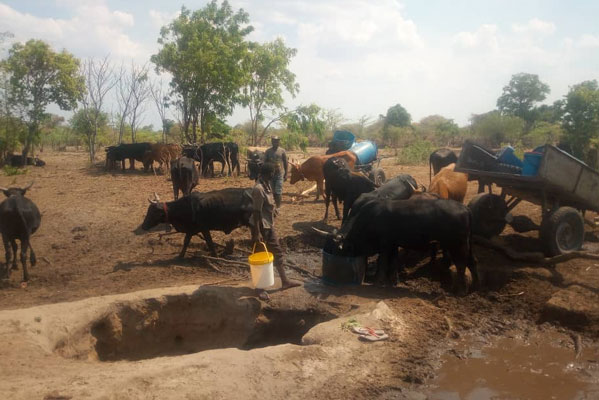
social commentary:with Moses Mugugunyeki
The Zimbabwe Red Cross Society (ZRCS) has intensified its water, sanitation and hygiene programme in Muzarabani district, Mashonaland Central province through an ambitious community resilience project.
The project, which has a number of components, including disaster risk management, health, water and sanitation as well as organisational development, is being funded by the Finnish Red Cross.
The major component of the programme involves the provision of basic sanitation facilities to the community, where open defecation and diarrhoeal diseases are the order of the day.
Muzarabani is in natural region four, which receives infrequent heavy rainfall subject to seasonal droughts.
It is believed that poor sanitation in the area is a major drawback to the district’s development, one of the marginalised in the country.
According to a vulnerability capacity assessment carried out by the ZRCS and the community from one of the wards — Chiwenga (Ward 24) — where the programme is being implemented, a large chunk of the population in the area practise open defecation and fetch water from unprotected water sources.
The assessment also identified major hazards, which include drought, flash floods, malaria, diarrhoeal diseases and strong winds.
- Chamisa under fire over US$120K donation
- Mavhunga puts DeMbare into Chibuku quarterfinals
- Pension funds bet on Cabora Bassa oilfields
- Councils defy govt fire tender directive
Keep Reading
Last year the government commissioned a solar-powered water project in Chiwenga, which was facilitated by the ZRCS. The project has turned out to be a boon to Chiwenga clinic and Chiwenga Primary School with over 840 pupils and 14 teachers as well as 150 households in the area.
ZRCS secretary-general Maxwell Phiri said their way of doing things was unique in that they give communities ammunition so that they can stand on their own without external support when disasters strike.
He said the projects allowed the communities to champion their own resilience, by determining the solutions to the priority risks that face them.
“Our programmes are not an imposition by the Red Cross to communities but are community-owned,” Phiri said.
“The challenges, including lack of water and sanitation, toilets, clean safe water sources, were identified by the community as a priority through a vulnerability capacity assessment as we sought to build better resilient communities.”
Phiri said the Chiwenga solar-powered water project was one way of having sustainable water resources for the community, which relies mostly on untreated water sources.
“The solar water project is a success story for this community of Chiwenga after numerous efforts to have potable water for the clinic and school hit a brick wall,” he said.
“There have been many attempts to drill boreholes within the periphery of the clinic, but it all came to nought because the water table in this part of the country is very low. We tried on many occasions to find a solution until we got water at a place that is 3,5km away.
“We engaged the community who helped with digging the trenches up to the clinic where we have tanks. The solar-powered programme has proved to be sustainable and we are mulling over spreading the projects to other wards.”
Phiri said his organisation was focusing on thematic areas of water, sanitation and hygiene as well as disaster risk reduction in the area. He paid tribute to the Finnish Red Cross, who are bankrolling the projects.
He said apart from the solar powered projects, Red Cross was also augmenting government’s water provision programmes.
“There are a few boreholes in the area and in some instances, communities travel up to 15km to get the commodity. In most cases, they would do with whatever is closer to them, unsafe water from sources of water known as Magambwe, in local lingo,” Phiri said.
“As Red Cross we are helping communities dig deep wells and some areas we are assisting with the drilling of boreholes. There are cases where certain schools are operating without boreholes, and the community provides the teachers with water.”
This publication established that most families were drawing water from wells dug along river beds.
“Despite having this water project, most families in this area are still getting water from unsafe water sources,” said Masimba Kaziboni, health centre committee chairman for Chiwenga.
“We still record diarrhoeal diseases because although the prevalence rate has gone down. Most families have no access to potable water and rely on unsafe sources. “However, we are happy that the Red Cross is assisting in the digging of deep wells and sinking boreholes.”
Environmental health technician for Chiwenga Milton Hwayerera paid tribute to Red Cross.
“Since Red Cross’ intervention, we have seen a marked decrease in diarrhoeal diseases. Sanitation coverage in this area is generally low and we applaud the Red Cross,” he said.
“The biggest challenge that we have is that villagers have no toilets and the coverage is very low. Open defecation is a cause for concern.”











